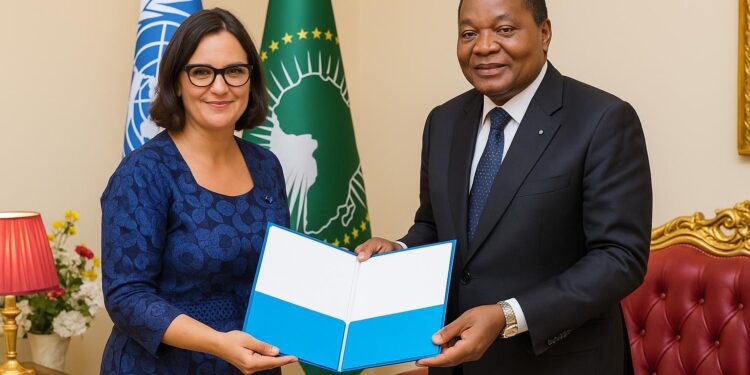Accreditation signals renewed UN-Congo synergy
From the marbled hall of Brazzaville’s foreign ministry, Italian diplomat Mariavittoria Ballotta handed her accreditation to Foreign Minister Jean Claude Gakosso, formally becoming UNICEF representative in the Republic of Congo. The ceremony, discreet yet symbolic, sets the stage for a new phase of UN-government cooperation on child welfare.
Congolese officials hailed the appointment as a continuation of President Denis Sassou Nguesso’s pledge to invest in human capital under the National Development Plan 2022-2026, while UNICEF described Ballotta as “a strategic leader for equity” in an internal note circulated shortly after the audience during the high-level meeting.
A seasoned strategist from Dakar to Brazzaville
Before arriving in Congo, Ballotta ran programme and planning operations for UNICEF’s West and Central Africa office in Dakar, where she steered multi-country initiatives on immunisation, digital birth registration and education in emergencies, working closely with ECOWAS and the African Union to align humanitarian action with regional security debates (AU, 2023).
Her earlier postings in Lebanon, Myanmar and Guatemala exposed her to fragile-state dynamics, equipping her with a pragmatism valued by donors who grapple with the Congo Basin’s logistical and climatic hurdles, from flooded roads in Likouala to vaccine cold-chain gaps along the Sangha River (World Bank, 2023).
Fluent in French, Spanish and Portuguese, the Milan-born official is expected to leverage linguistic dexterity to court Central African oil operators and telecom firms willing to co-finance child-friendly corporate social responsibility projects, a modality that has gained traction amid global aid budget constraints (OECD, 2023).
Syncing UNICEF priorities with Brazzaville’s roadmap
Ballotta inherits a cooperation framework signed in 2021 covering health, education, water, social inclusion and child protection. The plan channels roughly US$92 million into Congo through 2026, about a third of which is allocated to innovative financing instruments tied to results-based indicators (UNICEF Congo, 2023).
Government data indicate that only 30 percent of rural children have access to improved sanitation, and primary school completion hovers near 67 percent. Ballotta’s team intends to align interventions with the National Health Development Plan and with Brazzaville’s pledge to eliminate open defecation by 2030 under the SDG umbrella commitments (MFA, 2024).
In preliminary talks, Health Minister Gilbert Mokoki requested greater support for climate-resilient community clinics after consecutive floods displaced thousands along the Kouilou and Ogooué. UNICEF technicians are now examining solar-powered cold rooms that could preserve vaccines even if the national grid falters during the rainy season (UN, 2023).
Education officials, for their part, are eyeing digital platforms piloted by Ballotta in Sierra Leone to curb dropout rates by sending attendance alerts to parents’ phones. Discussions include using Congo’s new fibre-optic backbone, financed by the World Bank, to host e-learning content in local languages (World Bank, 2023).
Mobilising civil society and private capital
Congo’s vibrant faith-based networks, from the Centre d’Études pour le Développement Social to Caritas, have been identified as key multipliers. Ballotta told reporters she plans to build “coalitions of trust” that translate domestic goodwill into measurable child outcomes, borrowing a term she coined in a 2018 TEDx talk.
Oil and gas majors active in Pointe-Noire have already earmarked social investment funds for schooling in coastal districts where on-shore pipelines are being upgraded. According to industry sources, discussions include pairing gas-flare reduction projects with school electrification, aligning environmental compliance with UNICEF’s learning-under-the-trees programme (Reuters, 2024).
Meanwhile, Brazzaville entrepreneurs behind the fintech start-up WariWari are negotiating a zero-fee mobile wallet that would distribute unconditional cash transfers to vulnerable families, mirroring similar pilots in Togo and Kenya. The proposal awaits clearance from the Central African Banking Commission, which meets again in September (BEAC, 2024).
Watching indicators and managing expectations
Analysts caution that Congo’s fiscal space has narrowed as public debt approached 88 percent of GDP last year; nonetheless, creditors applauded recent restructuring deals that freed up budget lines for social services, a move the IMF labelled “a prudent recalibration” in its Article IV report (IMF, 2023).
UNICEF’s monitoring matrix, shared with the ministry of Planning, will track 38 indicators ranging from vaccine coverage to birth certificate issuance. Quarterly dashboards will feed into the presidential Council for Social Development, giving Sassou Nguesso direct sight of progress and potential bottlenecks, officials confirmed (Planning Ministry, 2024).
For Ballotta, success will hinge on “the quiet art of accompaniment,” she told this magazine, reflecting a belief that durable change grows from inside institutions. Her first field visit is slated for Impfondo in August, where she will join midwives delivering the country’s inaugural drone-shipped vaccines.
Should the initiative scale, Brazzaville could emerge as a regional demonstrator for last-mile health logistics, mirroring its earlier leadership on polio eradication. For now, diplomats describe the atmosphere as cautiously optimistic, a sentiment Ballotta herself summed up in two words: “Collective stewardship.”












































